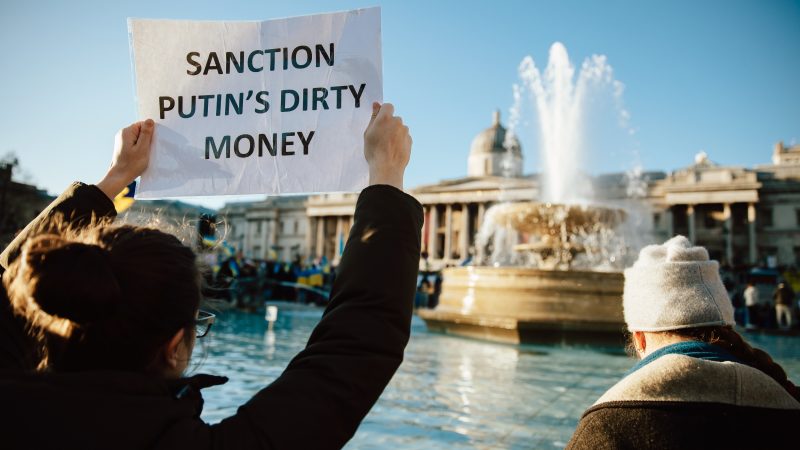
The Russian invasion of Ukraine has caused waves of change around the world. Germany has cancelled its commitment to Nord Stream 2 and dramatically reversed its stance on military spending. Ukraine is being encouraged to advance its EU membership application. Every facet of Russian economic engagement with the Western world, other than – for now – the supply of hydrocarbons, is being summarily cut off, and brand after brand is withdrawing from the Russian market.
Here in the UK, there has been sudden but welcome all-party support for addressing the ‘London laundromat’ phenomenon. The UK and its overseas territories and crown dependencies – the British Virgin Islands, the Cayman Islands, Jersey, Guernsey, Bermuda, the Isle of Man and Gibraltar – have long been the primary means enabling the theft of billions of dollars’ worth of assets from Russia and many other countries – generally developing countries – and then in protecting those assets from discovery.
We have seen the impact of the work of the International Consortium of Investigative Journalists with the publication of the Panama Papers and the Pandora Papers. Writers such as Catherine Belton and Tom Burgis, and campaigners like Bill Browder, Transparency International and the Tax Justice Network, have been telling us for years that the UK is at the heart of the problem. The truth has been known for a long, long time, and yet action in this country has been scandalously slow and lax.
But Vladimir Putin has achieved in a matter of days what all the foot-draggers, shoulder-shruggers and hand-wringers have failed to do in decades: he has focused minds on the reality of the damage done by our much-too-friendly attitude to dirty money – and all but united political rivals in wanting finally to bring about real change. This was clear in Monday’s House of Commons debate on the economic crime bill, in which voices from all sides pressed for rapid change in how the UK deals with dirty money.
Whatever reforms are instituted by the government – and they are all to be welcomed – everything rests on the ability to enforce. With an unusual air of consensus on the nature of the problem, it was disappointing to see the Tories vote down Labour amendments aimed at building that enforcement capability, such as the proposal that there be a report on the funding of enforcement agencies in respect of reforms to the unexplained wealth order system. Another amendment proposed by Labour that fell was the proposal that the government be compelled to produce draft legislation on the reform of Companies House.
As Labour MP Angela Eagle said in that debate, enforcement capacity is a major weakness. For example, she pointed out that the Treasury agency responsible for overseeing the enforcement of British sanctions, the Office of Financial Sanctions Implementation (OFSI), has the full-time equivalent of just 37 employees. The UK is at the centre of the global money-laundering and kleptocracy web, but its sanctions regime rests on the efforts of one room of people.
It is not just a question of headcount in the enforcement agencies, though numbers do matter. It is also about expertise and coordination. The relevant government agencies – OFSI, the Serious Fraud Office, Companies House, HM Land Registry, HM Revenue and Customs, etc – need to have at their disposal the very best experts in international tax and corporate structuring, trusts, accountancy, law, fraud investigations and the like. Anything else and there will be little to no hope of being able to keep up with the kleptocrats and thieves, who already have access to the most creative and knowledgeable minds in these areas.
Rather like white-hat hackers – hackers who use their IT skills for an ethical end – we should be recruiting, without embarrassment, the best minds from the City and offshore firms. High wages will prevent many from being drawn into the light, but there will be some – and perhaps more than one might expect – who can be convinced to cross over and help to strengthen systems against dirty money.
There is no point doing this in isolation. Kleptocrats win because they can find the gaps between different regimes with ease. One should not think there is suddenly going to be a benign, global enforcement capability, able to deal with every cross-border dodge and wheeze. But a higher level of coordination amongst agencies in the primary and secondary jurisdictions – including with the likes of Switzerland, Singapore, Mauritius and Panama – will take the enforcement battle to the kleptocrats, rather than tamely nibbling at the edges.
In recent years, initiatives at the G7, the G20 and the Organisation for Economic Co-operation and Development (OECD) have seen progress in coordinating efforts around achieving greater transparency and in data-sharing. We should build on that and create stronger, more effective transnational enforcement mechanisms and agencies. Without such improvements, any dirty money reforms will fail. The kleptocrats will be able to sidestep our efforts, and continue to move and hide vast reserves of wealth.




More from LabourList
MPs, union leaders and organisations react to ‘bruising’ Gorton and Denton result
A gory night for Labour
‘SEND reforms are a crucial test of the opportunity mission’